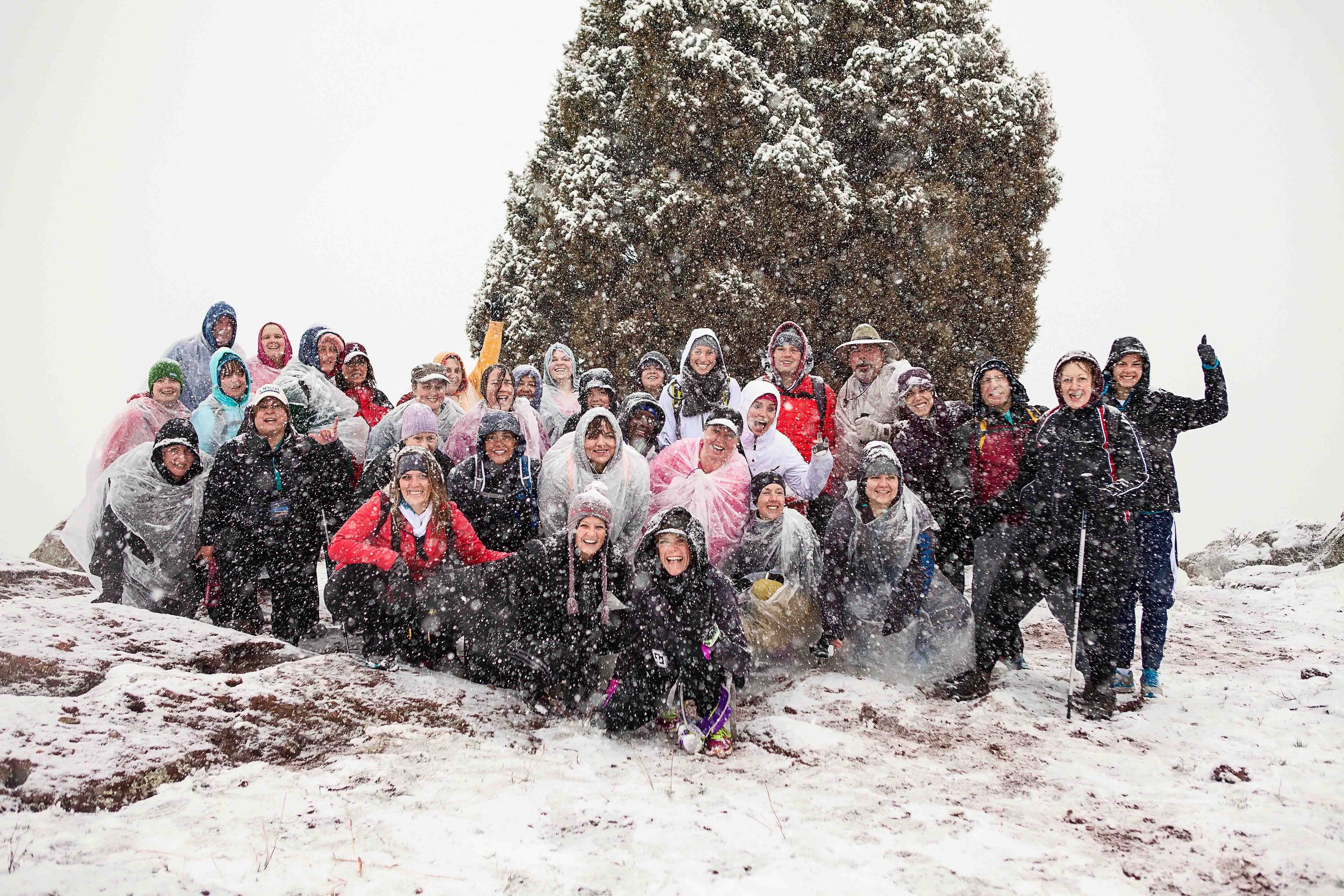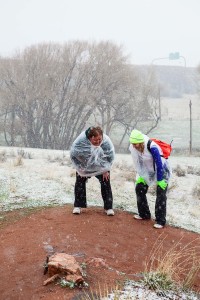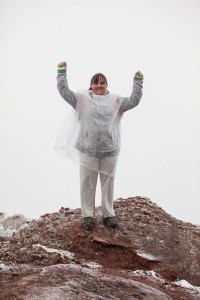A grueling itinerary | by

Weight-loss seekers flock to Colorado for boot-camp vacations

Up ahead, spread out along the switchbacks at Matthews/Winters Park near Red Rocks, 31 others who have sacrificed their vacation time, and a hefty chunk of cash, to travel to “Extreme Weight Loss: Destination Boot Camp” fight their own battles. Most have tried a litany of diets only to gain back what they’d lost. Many still have weight-loss goals in the triple-digits. By leaving high-stress jobs and unhealthy temptations behind and immersing themselves in a program that focuses on the mental side of weight loss as much as the physical, they have high hopes that this time will be different.
“Instead of going on a cruise and gaining weight, we decided to come here,” Rob Robinson, 54, of Calgary, Canada, says of the intense, week-long program hosted by the University of Colorado Anschutz Health and Wellness Center in Aurora. He gently clasps his struggling wife’s hand, and they start moving again, the mountaintop – and turnaround point ̶ coming into view high above them. “We needed this.”
New frontier

The United States makes up about a third of the market, with overworked businessmen and women flocking to spas, hot springs, multi-sport fitness camps, and mind/body retreats for a reboot. With the recent advent of CU’s “Destination Boot Camp” and the “Biggest Loser” resorts in Illinois, Florida and New York (modeled after the NBC reality show), industry experts predict “weight-loss tourism” is the next frontier. Add a new Estes Park program in the works ̶ a collaboration between CU, The Stanley Hotel, and the Estes Park Medical Center ̶ and Colorado is poised to be a hotspot.
“Americans work so hard and have so little vacation time, and because of their sedentary lifestyle, chronic diseases like diabetes and obesity are rampant,” says Beth McGroarty, research director for GWI. “People can no longer afford vacations that make them feel worse when they get back than when they left.”
Destination Boot Camp is the brainchild of endocrinologist Dr. Holly Wyatt, an associate professor and obesity expert in CU’s Department of Medicine and co-author of the weight-loss book “State of Slim” (Rodale; 2013). Shortly after the book’s publication, Wyatt got a call from ABC asking if CU would be interested in hosting “Extreme Weight Loss” – a noncompetitive reality show chronicling the year-long weight-loss journey of 17 extremely obese people. Participants would spend the first 90 days staying in a Denver hotel and working with Wyatt daily at the wellness center. It was a tough sell, Wyatt recalls.
“Not everyone thinks it is a great idea to have a reality show at an academic institution.” But she saw it as an opportunity to showcase the state-of-the-art center and convey to a national audience a message often overlooked in the pursuit of weight loss: that mindset matters. “Everyone focuses on the ‘what?’ and the ‘how?’ – What you should eat; how many minutes you should exercise,” she says. “That’s important, but it’s just as important to get at the ‘why?’ Why exactly are you doing this? What is your internal motivation? That’s what sets us apart.”
The show aired in May 2014, and inspired viewers were soon clamoring for a similar chance. The first four boot camps, totaling 133 tourists, sold out by fall. In March, another 32 tourists – including the Robinsons – arrived for a week-long, $4,000-per-person camp, complete with cooking and nutrition classes, grueling three-hour workouts, a steep 5-mile hike, and classes on how to “excuse-proof” your day. (See below). Online coaching and group support is provided for one year post-camp.
Set for success

Then, through a series of probing group discussions, she was asked to identify her “Why?” – the internal motivator that would help her stick with her weight-loss plan this time. “I am a confident woman in my work and home life. But I had a hate for my body,” recalls Pigott. “I realized that my WHY was to have my outside match my inside – to be truly happy with my whole self.” Today, Pigott weighs 182 pounds and is training for her first 5K. She recently gave away all the clothes that are now too big for her. “This is about more than weight loss. This is the new me,” she says.
Bruce Pitcher, a 29-year-old football coach from Utah, arrived at the CU campus as a contestant on the show in 2014 weighing 382 pounds and grappling with some deep-seated emotional problems from a childhood he says was plagued with physical and sexual abuse from his father. (His father is now serving life in prison). He has since lost 172 pounds and now serves as a motivational coach for the boot camp. His key message to campers: Have integrity, especially to yourself. “That is the vital piece of advice that I learned from Holly,” he says. “You can have a great outward attitude and keep your promises to everyone else, but if you have no integrity to yourself, everything falls apart. The key to weight loss is in being willing to get up every morning and do what you promised yourself you were going to do.”
With that advice in mind, and Pitcher and Wyatt there to remind her along the way, Lynn Robinson made it to the summit that day, where she and her husband were flanked by dozens of other exhausted campers who cheered their arrival at the top. A human-resources manager for Chevron who still struggles with obesity despite having gastric bypass surgery, Robinson says reaching that mountain top was an exhilarating and pivotal moment. “It was hard, really hard, but it’s also really hard to be fat. Now I’m choosing the right hard,” she says, after returning home to Canada. She’d already lost 13 pounds, down from 249, one week after leaving camp. And she’s just getting started, she says. “I am pumped. No more excuses.”
 GET YOUR MIND RIGHT
GET YOUR MIND RIGHT
Kick-start your weight-loss with these mental strategies
Find your why: List reasons you want to lose weight (play sports with your kids; watch your grandchild graduate one day; accomplish a certain goal in five years, etc.) When tempted to skip a workout or eat junk food, take a peek at your list.
Plan ahead: Decide what you’ll order online before going to a restaurant. Make a grocery list and don’t deviate from it. Treat exercise like any other appointment, putting it on your calendar, preferably in the morning, as research suggests willpower fades.
See the glass as half full: Look at exercise as something you get to do, not something you have to do. Identify something you like about your new lifestyle each day, rather than dwelling on what you miss.
Accept help: Make your promises to yourself (I vow to work out three times a week) as important as the promises you make to others, and let family pitch in at home so you have time to exercise.
Get eight hours of sleep: Lack of sleep leads to hormonal shifts that boost cravings for sugar and fat, and research shows sleep deprivation weakens willpower.
Adapted from the book “State of Slim,” (Rodale; 2013) by James Hill and Dr. Holly Wyatt.
Tags: University of Colorado
Comments
Leave a Comment
Please be respectful while leaving comments. All comments are subject to removal by the moderator.


I would not recommend this program for anyone. I was left projectile vomiting and projectile diarrhea in the hotel room which was provided by this program. NO ONE bothered to check on me. I was so sick I left on day 4, No partial refund was given. Legally they don’t have to. But they were the ones feeding me. Get a personal trainer, cut your calories and stay home, you’ll be better off.
Respectfully, Lynn Reese, I was there for the March week and not one person disapproves of this program. It has been a life changing experience for many. There are 32 people from March and the majority of us have experienced true change, lifelong friendships, and the mindset change has been priceless. I am sorry that you did not experience what we have experienced. I recommend this journey and I am only part way through. This experience will change your life forever
That’s an ineitllgent answer to a difficult question xxx
[…] Read more at Colorado Health & Wellness […]
My up to date ascend:
http://jo.forum.telrock.net
[…] Read More […]